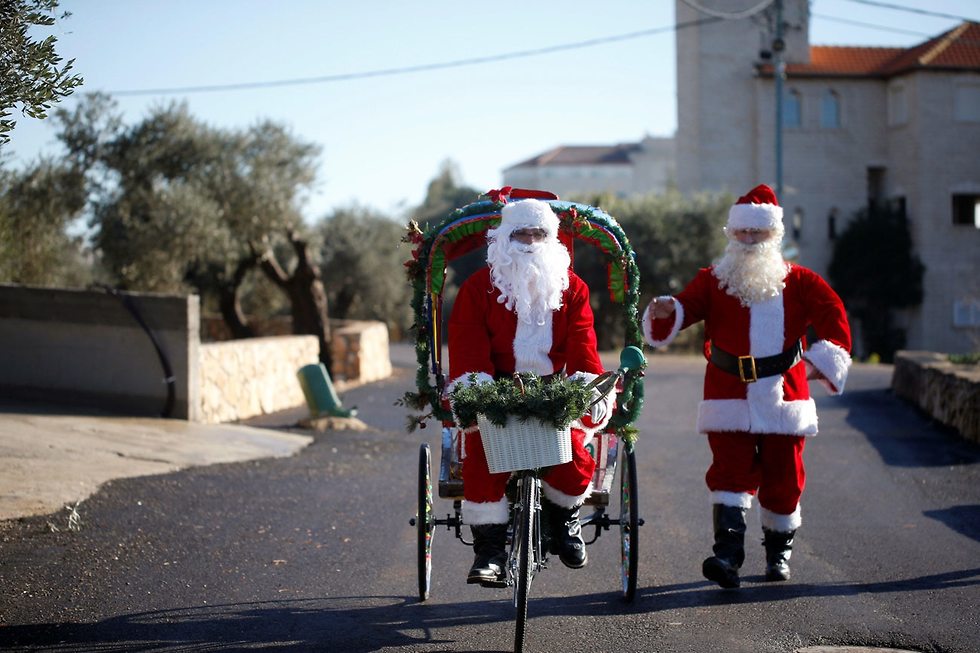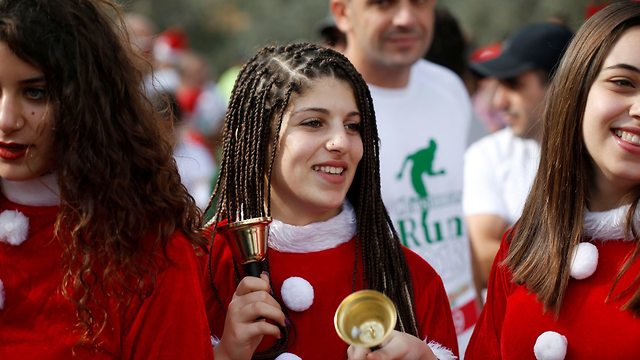
Mi’ilya and Fassuta are the only two Greek Catholic—or Melkite—towns in all of Israel. The Melkites trace their roots to the Christians of the 1st century in Antioch, a former Greek city located in what is presently Turkey and where Saint Peter introduced Christianity. The Melkite Church splintered from the Greek Orthodox Church in the mid-18th century and its adherents today, most of whom reside in the Levant, number some 1.6 million people.
The history of both villages dates back millennia, with archaeological excavations indicating the sites were inhabited at least as far back as the Late Bronze Age (approximately 1500 BCE). In its present incarnation, Mi’ilya is built over the ruins of a 12th century crusader fortress, its hillside stone houses and narrow alleyways surrounding the remnants of the castle. During the same era, Fassuta was known by the name Fassove. Most members of these communities originated in Syria, Lebanon or Jordan.
Each year ahead of Christmas, villagers deck the streets with vivid displays of color, in a bid not only to celebrate the holiday but also in hopes of attracting tourists.
To this end, tens of thousands flock to the area for the Western Galilee Winter Festival, an annual event featuring concerts, food tastings and tree lightings.
“In this region I always say we don’t coexist, we simply exist," said Michal Shiloah Galnoor, CEO of the Western Galilee Now Boutique Tourist Association, which organizes the festival. "We live here: Druze, Muslims, Christians, Jews, and even Bahais. We live together beautifully and every time it’s a holiday for one of the religions we all celebrate."
One of the biggest attractions in Fassuta are the metal workshops by Walied Khoury, one of only a handful of traditional blacksmiths in Israel. The walls of Khoury's workplace are lined with dozens of metal tools he fashioned himself.
“We are very happy to welcome people to our village," said Khoury, whose imaginative sculptures are found throughout the town. "Last year, more than 50,000 people came to the Christmas festival in the space of three days. This village is far away from all the problems in the region; it’s clean and we live here in peace.”
In Fassuta, this year's festivities have assumed added significance given that an ancient church, after being closed for more than 100 years, has been restored and reopened to the public. Beyond the church gates, intricately sculpted by Walied, is an enchanting hall replete with stone vaulted ceilings and traditional medieval-style Christian paintings.
“This is the first church of the village as far as we know," said Father Michael Assi, a priest at the nearby Mar Elias Church. "The villagers started using the church around 1750 up until 1907, when it was abandoned because it was too small. Another bigger one was then built to serve the community." Assi led efforts starting in 2016 to return the church to its former glory after witnessing how dilapidated it had become.
During the Ottoman Era, he recounted, Christians in the area suffered from persecution and conflicts often erupted between villagers, the Turks and neighboring Muslims. In response, many residents fled to Europe and North America.
“Fassuta is a special place," Assi said. "It’s far away from all the cities or heavily populated areas in Israel and it's also away from Lebanon or Syria so we live in peace here.”
For one resident, the Christmas season is a time for building communal bridges with her Israeli neighbors. Rima Khoury, the owner of the Beit Rima Community Center, has transformed her grandparents’ house into a visitors' center and welcomes groups to Fassuta year-round. Her ornately decorated living room is bedecked with colorful cushions, a large Christmas tree and black-and-white family photos.
"We can all live in individual rooms and feel that we’re living in the world but if we do not meet each other on a personal basis, there’s no chance for connection and communication and obviously there would never be a chance for peace," she said.
Living harmoniously alongside one another, especially given the ongoing persecution of Christian populations across the Middle East, was an oft-repeated message by the inhabitants of Fassuta and Mi’ilya.
“I am hopeful that Christmas will bring peace," said Father Nadim Shakur, a priest at Mi'ilya's Church of the Annunciation.
"Peace will come from the lord, but our leaders must also bring it. Enough with death and war. Instead of tanks, guns and knives let’s use flowers, kind words and good relations to accept the other as he is.”
Article written by Maya Margit
Reprinted with permission from The Media Line


















